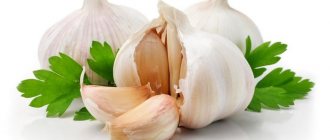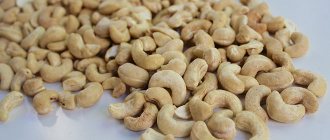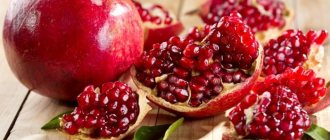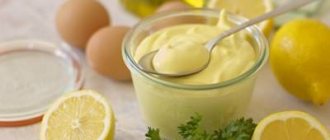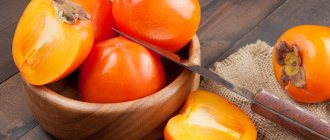How are prunes useful for mother and baby during breastfeeding?
Prunes are very popular due to their taste and beneficial properties. It is rich in vitamins A, B, C, PP. In addition, it contains a lot of minerals, including calcium, magnesium, zinc, potassium, iron, phosphorus. It is also high in fiber and pectin. Our body needs these substances for good functioning of the gastrointestinal tract. Prunes are a concentrate of useful substances that a fresh product contains - plums.
Prunes are very useful for breastfeeding. It will help relieve constipation for both mother and baby.
Regular consumption replenishes the reserves of vitamins and minerals in a woman’s body, depleted by pregnancy and childbirth. This contributes to the rapid recovery of the new mother. In addition, dried fruit has the following properties:
- normalizes blood pressure;
- puts metabolic processes in order in the body;
- removes toxins;
- slows down the aging process;
- improves the functioning of the gastrointestinal tract;
- normalizes the functioning of the nervous system;
- prevents the development of tumors;
- strengthens the immune system;
- helps in the fight against viruses;
- improves brain function;
- improves the condition of hair and nails;
- helps fight depression;
- increases vitality;
- removes excess fluid from the body;
- helps with constipation;
- removes toxins;
- improves the condition of teeth and bone tissue;
- increases hemoglobin;
- improves the functioning of the cardiovascular system;
- has a beneficial effect on muscle tissue, etc.
Effect on the child, help with constipation
Eating prunes by a nursing mother has a good effect on the health of the baby. Babies often suffer from constipation. If prunes are present in the mother’s diet, this problem can be dealt with. At an older age (from six months), prune decoction can be given to a child. It is important to remember that if your baby has persistent constipation, you need to consult a doctor and find out the cause of the problem. Constantly treating constipation with prunes is strictly prohibited.
Many claim that the product may cause the baby to have diarrhea. This is only possible if the mother eats fruits in unlimited quantities. The product is not allergenic, so the risk of developing allergies in infants is minimal.
How long does it take for prunes to pass into breast milk?
It is impossible to say exactly how long it takes for prunes to pass into breast milk. This depends on many factors: metabolic rate, the product was consumed on its own or with other food, etc. On average, the first portion of food enters breast milk within an hour and can be present in it throughout the day.
Reviews
Olga, 28 years old
At the maternity hospital they recommended a decoction of prunes for constipation. I had a caesarean section and had some difficulties with this issue for some time. I steamed 3 things in a mug and drank. It helped. The baby only had diarrhea once from this medicine.
Katya, 29 years old
I hate prunes. But breastfeeding women are not allowed to do anything. Ate. Well, that's okay. The little one didn’t suffer, it was delicious for me. Hooray.
Slava, 30 years old
I really love prunes in chocolate. During breastfeeding I had to eat regular chocolate without chocolate. Tasty too. The baby had no allergies, and her tummy did not hurt. Tasty and healthy, which makes me happy.
What harm can prunes cause while breastfeeding?
The main danger is associated with the laxative properties of prunes. If a mother eats too many dried plums, digestive disorders may occur for both her and the baby she is breastfeeding. Agree, there is little pleasure in the fact that both will suffer from diarrhea.
Another danger is hidden in the dishonesty of manufacturers who, to better preserve the product, treat it with harmful chemical compounds. Their entry into the body can lead to dire consequences for the health of the child and mother.
Possible harm of prunes during lactation, when and why should a nursing mother not eat prunes?
Despite the fact that the product has such a large list of beneficial properties, there are some contraindications and side effects. Since prunes have a laxative effect, they can cause diarrhea. People with diarrhea should not eat the treat. If your baby often has loose stools when you eat prunes, you should understand that this can cause dehydration. In addition, there is a risk of individual intolerance, when the use of the product is strictly prohibited.
Contraindications include:
- diabetes;
- liver diseases;
- acute stomach diseases;
- sick pancreas, etc.
Are prunes an allergen?
Prunes are not on the list of allergens, so the answer to the question: is it possible to eat prunes while breastfeeding, yes, it is possible and necessary. Despite this, there is always a minimal risk of individual intolerance to the product. Therefore, after eating prunes, the mother should carefully monitor the baby’s reaction. The presence of rashes, itching, tearing, etc. are symptoms of allergies. If you see such a reaction, stop eating prunes immediately. If symptoms are acute, you should immediately contact your pediatrician.
Useful properties and composition
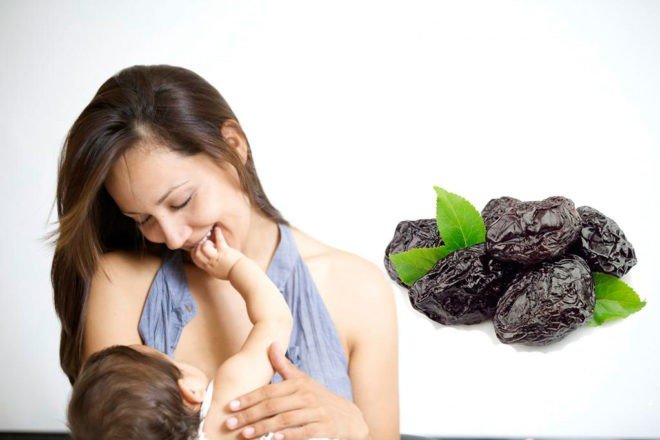
Dried fruits retain maximum beneficial elements. Prunes are appropriate for breastfeeding because they help the female body normalize all important functions. The main components of the composition are presented in Table 1.
Table 1 - Chemical composition of prunes
| Element: | Percent Daily Value: | Action: |
| Alimentary fiber | 45 | They normalize intestinal function, improve immunity, lower cholesterol levels, and help control appetite. |
| Vitamin E | 12 | Necessary for the functioning of the heart muscle, improves skin condition, and is an antioxidant. |
| Potassium | 34.6 | Regulates the balance of water, acids, electrolytes in the body. Improves the functioning of the kidneys and heart. |
| Magnesium | 25.5 | Necessary for the functioning of muscle fibers, blood vessels, and the construction of bone tissue. Improves heart function, stabilizes blood pressure. |
| Iron | 16.7 | Effectively fights postpartum anemia. |
With such a list of nutritional elements, it is clear that prunes are beneficial for a nursing mother. 100 g of product contains 256 kcal - about 15% of the daily requirement. It should be taken into account that 1 berry with a seed weighs 30 g, that is, 100 g of the nutritional part will be contained in 4-5 pieces.
Prunes are made from plums, but not all of them. Only certain varieties containing 20% dry matter and more than 12% sugar are suitable for drying. The skin should be blue and thick. The fruit, like the seed in it, is chosen to be small in size.
Prune or plum compote - what to choose?
Prunes are dried plums. Therefore, the properties of a fresh fruit do not differ from dried ones. It doesn’t matter whether you cook plum or prune compote. During the plum season, you can safely cook compote from fresh fruits. And when there are no fresh plums on sale, buy prunes for compote.
You can stock up on country plums for the winter. To do this, wash the fruits, cut them in half, remove the seeds and let them dry. Wrap a cutting board or tray with cling film, place the plums on it in one row and put them in the freezer for several hours. During this time, the plum will freeze and can be transferred to a bag, and the next batch can be placed on the board for freezing. If you put the fruits directly into a bag, bypassing the board, the plum will stick together and you will only get it out of the freezer in one big lump.
How much prunes can nursing mothers eat?
Many mothers know what healing properties prunes have, for this reason they try to eat them. Daily consumption of the fruit in question improves the functioning of the baby’s poisoning system, as a result of which there is a noticeable improvement in sleep, the baby remains calm and is not capricious.
What is the best way to consume prunes for nursing mothers?
It is important not to be in any hurry. It's worth starting with small doses. On the first day, it is recommended to eat no more than one berry, and after feeding, monitor the baby’s reaction. If he behaves quite calmly, then the next day you can double the dose - two berries.
Often the mother's intake of one berry is enough to improve the baby's digestion. It is important not to rush, even if you really want it, because from a sharp change in the composition of milk, the baby will immediately feel it and it is not a fact that his body’s reaction will be positive. There are even cases of hospitalization.
If the consumption of prunes is rejected by the baby’s body, the following symptoms appear:
- restless state of the baby;
- the occurrence of severe diarrhea;
- redness in the form of spots;
- does not fall asleep for a long time at night;
- the appearance of rashes on the surface of the skin.
If at least one reaction that is on the list appears, you should stop eating dried plums for a while. It is important to always adhere to the norm.
Dried fruit compote has a gentle effect. It is important to know that prunes, according to the recommendations of pediatricians, are allowed to be eaten by breastfeeding women three months after giving birth. If this is a compote from the same fruit, then women should drink it from the very beginning of feeding. It is important to monitor the dosage.
When should prunes be introduced and how much can a nursing mother of a newborn eat?
Due to its beneficial properties and hypoallergenicity, prunes are allowed to be eaten in the first month after childbirth . The first time it is better to eat one thing in the first half of the day. Allergies or bowel problems usually appear within 24 hours. If no negative reaction is detected, you can gradually increase the amount. It is not recommended to eat more than 5 pieces per day, so as not to provoke diarrhea in the baby. In the second month of a baby’s life, while breastfeeding, the mother can definitely eat 5-6 prunes a day. But remember that you need to increase the amount gradually. If you eat store-bought prunes, be sure to soak them in boiling water for a few minutes before eating. If you use dried fruits while breastfeeding to prepare compote, it is better to use other products as a basis, and add prunes in the amount of 5-6 pieces per liter.
In the first days, first month after birth
Prunes can be eaten when breastfeeding a newborn in the first month. Moreover, you can eat it already in the first days after birth. It is recommended to mothers for constipation, as many have problems with bowel movements, especially after a cesarean section. The product does not cause difficulties when entering the gastrointestinal tract. It improves digestion. That is why it is recommended to drink a decoction or compote of prunes for colic in a baby. If your child has frequent bowel movements or diarrhea, avoid this product for a while.
How much can you eat per day?
| Child's age | 1 month | 2–5th month |
| How much can mom eat? | 1–2 pieces per day | 5–6 dry fruits per day |
Is it possible to eat prunes during breastfeeding?
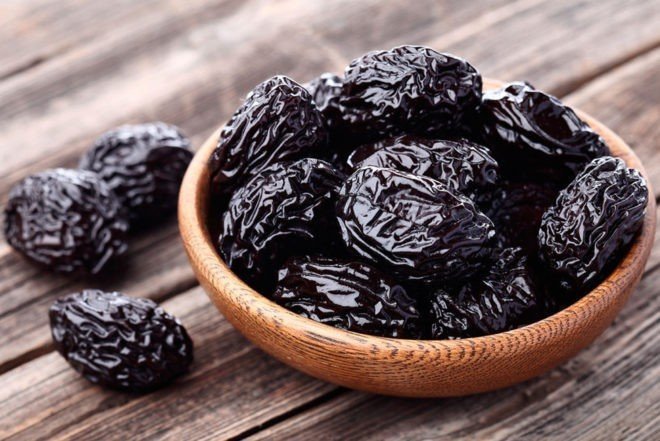
Prunes are included in the list of products for a healthy snack for a nursing mother [1].
For the first time, it’s enough for mom to eat a piece of prune. Then everything depends on the reaction of the child’s body: if for two days no redness, swelling, or rashes appear on the baby’s skin, and the stool is normal, prunes are suitable.
Mom can gradually increase the amount of dried plums she eats to 3-4 pieces; the total amount per day should not exceed 7 berries. Dried fruits do not have to be consumed in their pure form; they can be added to dishes: there are many recipes for milk porridges, meat, and casseroles with prunes.
Prunes in the first month
In the first month, a nursing woman can eat prunes: it is at this time that dried fruit helps cope with postpartum problems such as constipation. A large percentage of dietary fiber in dried plums will help mother cope with the disease without the use of medications.
Does it affect the baby's stool?
Expert opinion
Sokolova L. S.
Pediatrician of the highest category
It is not recommended to introduce prunes into the mother’s diet during the child’s illness. Dried fruit should be discarded if the baby has loose stools, colic, or bloating.
How to cook prunes for a nursing mother?
Nursing mothers can eat prunes not only raw. It is used to make compote and add it to baked goods, desserts, meat and other dishes. It is important not to exceed the maximum dosage. Then such dishes will bring even more benefits.
How to cook compote from prunes and apples, which you can drink in the first month of breastfeeding?
In the first month, you should not cook compote exclusively from prunes. The most suitable recipe would be apples and prunes. Apples are also allowed from the maternity hospital. This combination is tasty and healthy.
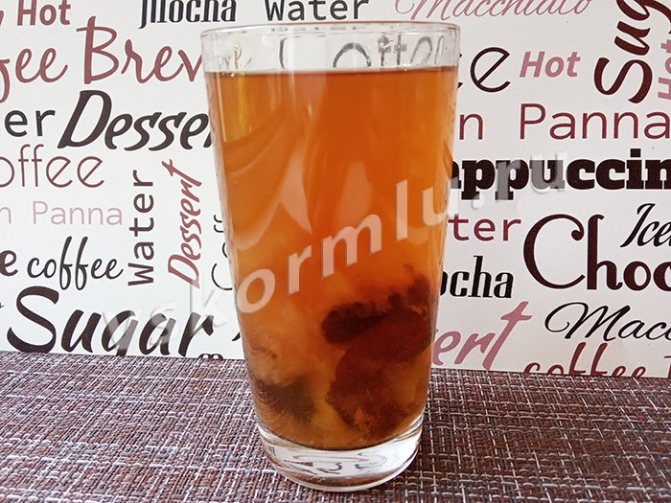
Compote of prunes and apples for a nursing mother.
Compound:
- Apples - 1 large.
- Prunes - 100 g.
- Sugar - up to 100 g (to taste).
- Water - 1 l.
Preparation:
- Soak prunes in warm water for 10 minutes.
- Boil water and add washed prunes. It is better to first cut the fruits into 2 parts. This will enhance the beneficial properties of the compote.
- Add sugar.
- Wash and cut the apples.
- Add apples to compote and cook for 5 minutes.
- Let stand covered for 1-2 hours.
- The compote can be passed through a fine sieve and the fruit discarded. Or you can drink compote directly with fruit. It's a matter of taste.
Prune and raisin compote recipe
If your baby has grown a little and you want to diversify the diet, you can try compote of prunes and raisins.
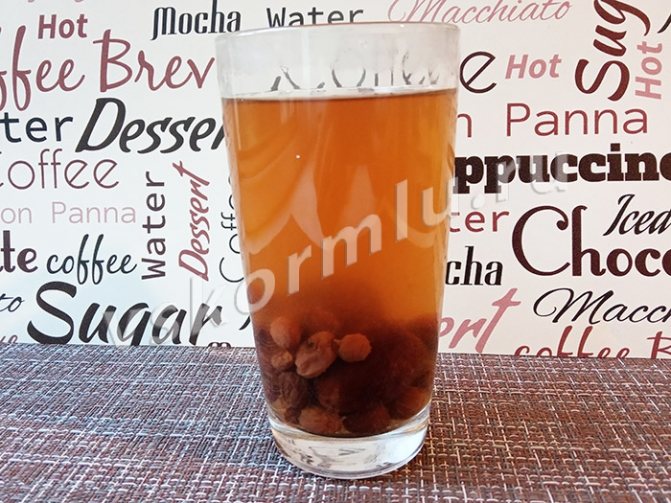
Compote of prunes and raisins while breastfeeding can be drunk 2 months after birth.
Compound:
- Prunes - 400 g.
- Raisins - 100 g.
- Sugar - to taste.
- Water - 2 liters.
Preparation:
- Soak dried fruits in water for 10-15 minutes and rinse.
- Boil water and add prunes.
- Cook for 10 minutes and add sugar. Prunes and raisins are sweet on their own. Therefore, you may not need sugar.
- Add raisins to the compote and cook for another 5–10 minutes.
- Cover with a lid and let stand for several hours.
- Dried fruits from compote can be thrown away or eaten.
Read about the use of raisins in the article “Can I have raisins while breastfeeding?”
Activia yoghurt with prunes
Activia yogurt has a great taste. The manufacturer says that it is saturated with bifidobacteria. If you look at the composition on the packaging, you can see the presence of flavorings, thickeners and other harmful components. This yogurt should not be eaten while breastfeeding, especially in the first months.
Kefir with prunes
Kefir and prunes go well together in taste. The products have many beneficial properties. Their combined use promotes weight loss. To do this, mix prunes with kefir and beat with a blender. To get rid of excess weight, drink a glass of this drink every night before bed.
Prune puree
This dish has a lot of useful properties. Thanks to this, it can be eaten in small quantities from the hospital. This dish is included in the list of products for the baby's first complementary feeding. You can buy ready-made jars of baby puree in the store or prepare it at home.
Compound:
- Prunes.
- Water.
- Sugar.
Preparation:
- Fill the prunes with water and rinse.
- Cook the dried fruits for about 20 minutes over low heat.
- Beat with a blender. You can first remove the skin from the prunes if the puree is for a baby.
- You can add sugar.
You can make prune puree with apples. To do this, boil them with prunes for 10 minutes.
Salad “Beets with prunes”
This salad with walnuts can be eaten by nursing mothers from 4-5 months, if all the components are already included in the diet. You can try without nuts when your baby turns 2 months old.
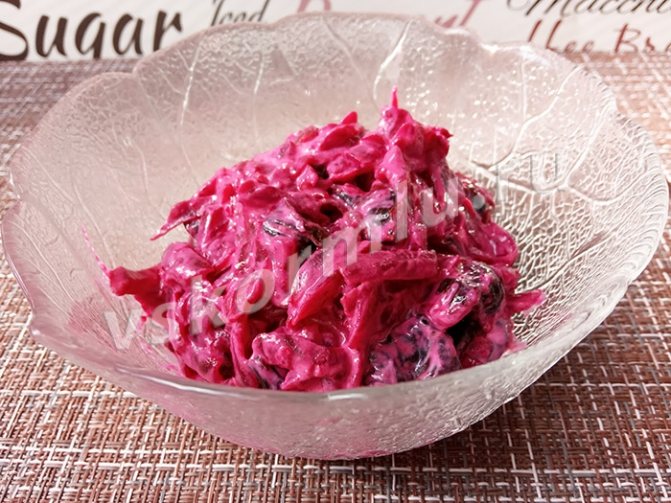
Beetroot salad with prunes for a nursing mother. This time I made it without nuts.
Compound:
- Beets - 4 pieces.
- Prunes - 150 g.
- Nuts (walnuts) - a handful.
- Sour cream - 5 tbsp. l.
Preparation:
- Boil the beets.
- Pour warm water over the prunes.
- Roast the nuts. Read more about this product in the article “Nuts during breastfeeding.”
- Grate the beets.
- Grind dried fruits and nuts.
- Mix the ingredients and season with sour cream.
Cottage cheese with prunes
If you are looking for something sweet to eat while breastfeeding, pay attention to cottage cheese with prunes. Such products are allowed for nursing mothers, and the dessert is very easy to prepare. To do this, mix cottage cheese, sugar or condensed milk, sour cream to taste and beat with a blender. Add chopped prunes. Dairy products are allowed for nursing mothers one month after giving birth.
Decoction
Prune decoction is the most concentrated form of the drink. It is useful for normalizing the gastrointestinal tract, improving digestion and treating constipation. It should be brewed in the same way as dried fruit compote, but the concentration of prunes in this drink is several times higher, so it needs to be drunk in smaller quantities. It is not recommended to drink the decoction more than once a day.
Infusion
The infusion is also a concentrated form of the drink, so it is important to pay attention to the dosage. Excessive consumption of prunes during breastfeeding can provoke negative reactions from the infant. Remember that even the safest product can cause allergies and colic if eaten in large quantities.
Compound:
- Sugar - 100 g.
- Water - 1 l.
- Prunes - 400 g.
Preparation:
- Rinse prunes in warm water.
- Pour boiling water over it.
- Cover with a lid and wrap.
- Let it sit for a day.
Prune dishes
To diversify the menu, you can prepare dishes from this dried fruit.
Compote
To prevent constipation, you can prepare prune compote. It preserves all the beneficial elements found in dried plum berries.
Ingredients:
- Prunes – 200 gr.;
- Sugar – 2 tbsp. l.;
- Water – 0.5 l.
Sort the berries and rinse them thoroughly. Place the berries in hot water and add sugar. To stir thoroughly. After boiling, cook for 20 minutes over low heat.
Sugar can be added at your discretion, since it is already included in the structure of dried fruit in sufficient quantities.
Experts advise drinking prune compote with caution when breastfeeding, starting with one glass per day.
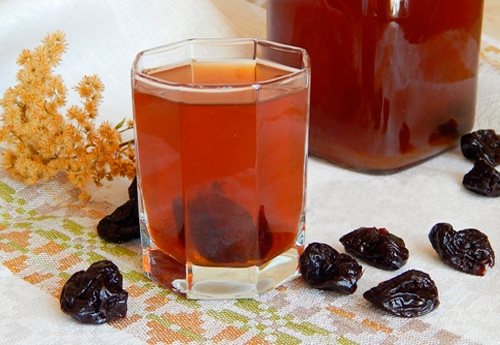
Yogurt
In order not to harm your health with purchased ones, you can make your own yogurt from prunes. To do this, you will need low-fat kefir and dried berries (8-10 pcs.). Mix everything and beat until it reaches the consistency of sour cream.
Homemade yogurt is good for bones due to its calcium content. It also contains bacteria that have a beneficial effect on the microflora of the stomach.
Steamed prunes
For constipation, you can steam and drink water. Take 10 berries, add warm water and leave overnight. You can drink water in the morning. In addition, if the baby is already more than 2 months old, then you can give him 1 teaspoon per day, observing the condition of the baby.
Prunes occupy one of the first places among dried fruits. The vitamin content in it will help replenish the missing substances in the body. If you know when to stop, you can avoid side effects and enjoy delicious fruits without consequences.
Selection and storage
The choice of prunes, especially during breastfeeding, must be approached responsibly. Store-bought products may have chemicals added or gassed. It is harmful to eat such dried fruits.
High-quality prunes should be black. If you see a brown tint, it is not dangerous. This is a consequence of the fact that the plum was doused with boiling water to remove bacteria. Shine is a sign of a low-quality product treated with glycerin. Plaque, mold, and the smell of dampness are also reasons to refuse the purchase. The product tastes sweet and sour. An unpleasant taste should alert you.
It is best to store prunes in a glass container in a cool place. It is advisable that it is well ventilated. The maximum shelf life of a dried product is 1 year, a dried product is several months, but it is better to eat it quickly.
